Crimson Worlds Collection II Read online
Page 36
“Yes, sir.” Carp took a few seconds, punching keys on his workstation. “Course computed, sir. I have set minimum detection profile as the prime variable.” There were a variety of intensity and duration combinations that would bring the ship into orbit, but minimizing the chance of detection was essential. “It’s a 1.75g burn for 87 seconds.” He worked his controls again for a few seconds. “Locked into the navcom, sir. Ready to execute.”
Jacobs looked out over the bridge for a few seconds. Hornet had been scouting for almost two months, moving deeper into the void, toward First Imperium space. They’d scanned three enemy task forces, all heading directly toward Adelaide’s system and, presumably, farther up the line. He hoped that Cooper and his people were keeping their heads low. It didn’t seem like the enemy was interested in Adelaide, but the system was a highway to the front. “Execute.” He held his breath for a few seconds. He’d just put his ship at greater risk than at any time since leaving Adelaide.
The feeling of weightlessness was suddenly replaced by almost two gravities of pressure. The burn was a light one, and the forces involved were moderate, but after spending most of the last two months in freefall, the feeling of almost twice normal weight was a shock. Jacobs leaned back in his chair, trying to position himself as comfortably as he could.
“Watch those scanners, ensign.”
“Yes, sir.” Carp’s voice was rock-solid. The crew had been getting brittle, edgy. They were deep behind enemy lines, sneaking around, using as little power as possible. That meant no simulated gravity and minimal heat and life support. Physical misery was worsened by the brutal tension. One slip up, one bit of bad luck, and they’d be detected. And then they’d all die. The stress was constant. That slip could come at any time. There wasn’t a second they could let their guard down, not an instant they could relax and feel safe. But Ensign Carp was as focused as he was the day they’d left Adelaide. “Orbital insertion in ten seconds, sir.”
Jacobs took a deep breath and counted silently. He felt the abrupt change as the engines shut down and Hornet slid into orbit. The feeling of freefall was a physical relief, but his stomach was still clenched with worry. There was no way of knowing if anything had detected them, but if it was a ship within weapons range, they’d find out soon enough.
“Lieutenant Mink, I’m going down to the surface.” He stood up slowly, allowing his magnetic boots to grip the floor. “You have the con.”
Mink had a troubled look on her face. “Sir, I don’t think you should take the risk of joining the landing party.” She hesitated, trying to decide exactly what to say. Challenging a superior officer’s directives was a delicate art. “I suggest you send me instead.”
Jacobs smiled. Mink was a good officer. She didn’t have Carp’s natural ability, but she was dedicated, and her service record was excellent. She was right. By the book, Jacobs had no place on that shuttle. But they were way beyond the book now.
“I appreciate your concern, lieutenant, but I want to have a look down there for myself.” His expression became serious. “And while you are in command, your priority is to the ship, not to the landing party or to me. Understood?”
Mink forced herself to look back at Jacobs. “Yes, sir.”
“Very well. Please instruct Ensign Ving to meet me at the shuttle…and Sergeant Lasken and one of his Marines.” He turned away and walked slowly to the dropshaft, gripping the ladder and pulling himself carefully down to the shuttle bay without another word.
Jacobs felt an odd chill. The sun was shining and the weather warm, but he shivered nonetheless. The shuttle had put down just outside the settlement, and they could see immediately it was nothing but a lifeless ruin. There was an eerie feeling to it, like a tomb. Death was hanging in the air, still and cold.
The Marines took the point, heading toward the blasted village. Jacobs followed, but he knew in his gut there was no one left alive on Newton. He didn’t think there were any First Imperium fighters remaining either. It looked like they’d left sometime after they wiped out the inhabitants. There was nothing but the silence, a haunting stillness.
“Captain, there’s no one alive in the village.” Sergeant Lasken’s voice was loud in his earpiece. “It looks safe, sir.”
Jacobs hadn’t been waiting…he was already at the main entrance. It looked like there had been a good-sized gate there before, but the entire section of fence around the entry was blasted apart, nothing remaining but a few shattered remnants lying about on the torn up ground.
There were bodies inside, or at least the remnants of colonists who had lain unburied for more than three years. They weren’t much more than bleached bones now, with a few hunks of withered tissue still attached. But Jacobs could tell they had been running when they were killed. He could imagine the scene in his head: men, women, children…fleeing, screaming, driven in terror to try to escape the village that had been their home, but now was their graveyard. He pictured the relentless machines, moving forward, gunning down the helpless civilians with no pity, no hesitation. He could feel the anger, the hatred. He’d seen enough. He was sure there was no one alive on Newton. There was nothing his people could do there. “Ok, people, let’s…”
“Captain!” It was Ensign Ving on the com. “We’ve got a Gamma-3 signal from Hornet.”
Jacobs felt a new surge of tension in his stomach. Gamma-3…enemy contact. Hornet would be running silent by now, sitting and hoping to remain undetected. The last thing the landing party could do was launch the shuttle. The thrust needed to get into orbit would be detectable for millions of kilometers. They’d just have to sit and wait…and hope the enemy passed by. Otherwise, Hornet would be doomed…and Jacobs and his party would be marooned on a dead planet deep in enemy territory.
“What the hell are those?” It started as a silent thought, but Jacobs blurted it out. Hornet was running silent, and the scanners had picked up what looked like two First Imperium ships blasting almost directly toward them at 10g. They didn’t match any previously known enemy design. “Looks like we stumbled onto a new ship class.”
The landing party had gotten a good scare, but the enemy task force that triggered the Gamma-3 alert passed right by and through the system. Jacobs and his people on the surface were marooned but not for long. Other than spending a few nerve-wracking days eating emergency rations they were unscathed and waiting when Lieutenant Mink’s communication gave them the all clear to return to the ship.
After his delayed return, Jacobs decided Hornet would continue exploring. It was the only way he could think of to contribute to the fight, to hurt the enemy. And after what he’d just seen, he desperately wanted to lash out. Newton had been the most remote human colony and the first place the enemy had attacked, but now Hornet was well beyond the borders of the Alliance, deeper into unexplored space than any navy ship had ever ventured. They’d advanced cautiously, on silent running as much as possible, but they hadn’t passed any new enemy forces since leaving Newton. Until now.
“We have data incoming, captain.” Ensign Carp may or may not have realized Jacobs was thinking out loud, but he tried to answer the captain’s question anyway. “They’re fairly large, about 90,000 tons.” Carp paused, staring at the information coming to his screen. “The design is significantly different than any of their other ships. They appear to be constructed of consecutive circular sections.”
Jacobs nodded his acknowledgement. “Lieutenant Mink, any sign they’ve detected us?”
“No, sir.” Mink turned to face the captain. “There’s no way to be sure, but it looks like we’re still hidden.” She paused, a troubled look on her face. “But our current course will take us within 2,000,000 kilometers of the nearest ship. It will be a miracle if they don’t find us. And if we execute a burn this close to change our vector we might as well be lighting a flare.”
Damned if we do, damned if we don’t, Jacobs thought, silently this time. “We’ll have to make a run for it.” He inhaled deeply. “They may not chase
us. There are only two ships, and they may be needed farther forward.” He didn’t sound convinced, which wasn’t surprising, because he wasn’t. It was a shot in the dark, but the only thing he could he could think of.
“Sir, the AI is chewing on the enemy vessels’ stats.” Ensign Carp again, his voice somewhat distracted, deep in his own thoughts. “The readings are very odd.”
“How so, ensign?”
“For starters, sir, it doesn’t appear to mount any weaponry, at least none we can detect at this range. The hull is perfectly smooth. No external missiles, no ports for internal launchers or particle accelerators.” He paused then looked up from his screen. “Very strange.”
“I want you to analyze every bit of data we get from that ship, ensign.” Jacobs was definitely puzzled. Every First Imperium ship class that had been encountered to date was heavily armed, even the supply vessels. Either this ship had some different type of armament, something they didn’t know how to look for, or it was a complete departure from the rest of the enemy fleet. “Every detail.”
“Yes, sir.” Carp paused, but only for a few seconds. “Another thing, captain…the ships are putting out a much larger energy signature than they should be.” He stared down at his screen, rechecking his calculations. “Based on previous data for First Imperium vessels, they are using at least twice the energy they should be at their current thrust level.” Another pause, longer this time. “A significant amount of the energy expenditure is spread throughout the vessel, sir. It’s almost as if…” His voice trailed off.
Jacobs stared over at Carp. “As if what, ensign?”
“Sorry, sir. It’s almost as if there is some sequence of systems distributed along the vessel, all of which use an enormous amount of energy.” His voice was distracted as he spoke, and his eyes didn’t move from his workstation. “Fuck…,” he muttered under his breath.
“Ensign?”
“Captain…” Carp’s head snapped upright and turned to face Jacobs. “…I think those are antimatter transport ships. The energy expenditure could be from the containment systems.”
Carp was making a wild leap, and Jacobs knew it. But Hornet’s captain was immediately convinced anyway. It made sense. It explained the anomalies. He knew in his gut the gifted young officer was right. “Calculate projected energy required to contain that much antimatter, ensign, and compare to the data from those ships.” Jacobs was asking for the wildest of conjecture. They had no idea what technology the First Imperium used to trap antimatter. All Carp could do was extrapolate from the Alliance’s own nascent process and then estimate the superiority of the enemy systems the best he could. In other words, guess. But antimatter had to be contained, that was as true for the First Imperium as it was for the Alliance. Otherwise it would annihilate immediately with whatever matter was at hand. And containing massive amounts of antimatter would require a lot of energy, even with the First Imperium’s advanced technology.
Carp worked the numbers several ways, but he still ended up making up at least half of it. “Sir, I believe my hypothesis is correct, though we lack the data to reliably confirm.”
Jacobs, leaned back in his chair, thinking. It did make sense. They were way behind the front lines, and the enemy wouldn’t be expecting any human warships here. They’d most likely consider this a safe zone for transporting the precious material closer to the front. He wondered, could Hornet take these ships out? She still had all 8 plasma torpedoes, and an antimatter transport was bound to be fragile. All his attack had to do was breach a single containment system. The stored antimatter would do the rest.
But if he was wrong, if these were some other type of ship, if they had any weapons…Hornet wouldn’t stand a chance. The bridge was silent, everyone waiting for the captain’s response. Finally, he spoke, his voice grimly determined. “Good work, Ensign Carp.” He turned his head toward Mink’s position. “Battlestations, lieutenant.”
Chapter 7
Tewksbury Steppe
Planet Sandoval
Delta Leonis IV
“The Line”
General Isaac Merrick leaned back in the hard plastic seat. The interior of the heavy main battle tank was cramped, but he was getting used to it. Merrick had emigrated to escape from the disgrace heaped on him after he returned to Earth, having failed to crush the rebellion on Arcadia. He was treated unfairly, made a scapegoat for the embarrassing failures Alliance Gov suffered on most of the rebelling worlds. Merrick had been a creature of the Alliance system and, born into its upper class, he’d never questioned it…until then. But what he’d seen on Arcadia made him reconsider everything he’d believed all his life, and the way he was sacrificed when he returned made it clear to him where he stood. There was no place for him on Earth anymore.
Emigrating wasn’t an easy choice for a member of the political class. He was used to a way of life, to certain preferences and privileges that came with his station and, even in disgrace, he would enjoy those perquisites the rest of his life. Leaving Earth meant giving it all up. Most of the colonies were young societies, and they had strongly egalitarian social structures, with no entrenched upper classes ruling over the rest. He’d come to admire it, but living with it would be something different entirely.
There was another problem as well, or at least he’d expected there to be. He had led an army against the rebels on one of the most important colony worlds, and he’d come close to defeating them. Thousands of Arcadians had died fighting his troops, including their immensely popular commander, William Thompson. He wasn’t at all sure the colonials, his former enemies, would accept him, and even if they did, he had no idea what he’d do. His only trade was soldiering, and he couldn’t imagine the Marines would take him into their ranks.
Merrick was stunned when he met with General Gilson at the Marine HQ on Armstrong. She welcomed him and extended an invitation to work as a consultant, assisting with the rebuilding of the Corps. More surprisingly, Kyle Warren was there too, recently reactivated as a brigadier general, and he too welcomed Merrick. Warren had commanded the army that faced Merrick on Arcadia. The two old enemies shook hands and vowed to work together.
The First Imperium incursion changed everything. When the Powers realized what was happening and agreed to work together, the governments tried to move as much force to the front as possible. Once they understood the situation, the politicians wanted the enemy defeated as far from Earth as possible. But the terrestrial armies were generally inferior to the spaceborne forces, and masses of unarmored infantry were useless against First Imperium battle robots.
Heavy tanks were another story. Combined had been were rare in colonial wars. Battle in space was dominated by logistical concerns, vastly more than warfare on Earth. Battlefields were separated by lightyears, and even with the warp gates, ships had to carry troops and equipment millions of kilometers to the front lines. Moving and supporting more than token forces of tanks, planes, and artillery was simply not practical. Colonial warfare had been the province of light troops, and over time those mobile forces developed into powered infantry. The improvement of combat armor had brought heaviness to the spaceborne formations without massively increasing their logistical requirements.
But now all the nations of Earth were united, and every spacecraft capable of transporting military supplies had been requisitioned. Some of those ships began carrying forces from Earth, mostly tanks and aircraft. And when an Alliance tank corps arrived on Sandoval, Cain immediately sacked the commanders from Earth and sent for Merrick. The fired officers were all members of the political class, and it would cause a firestorm on Earth. But Cain didn’t give a rat’s ass.
Cain had met Merrick on Arcadia, when the Alliance general surrendered his forces to Kyle Warren’s rebel army. He’d gotten a good impression, one that was reinforced by Warren’s obvious respect for the former federal commander. Merrick was a soldier, a professional. He’d fought on the other side in the rebellions, but he done so honorably and without the sadism d
isplayed by many of the other federal generals. The Marines were happy to welcome a new friend and ally, one who, by all accounts, was also highly competent.
The M-275 “Scott” main battle tank was one of the most awesome instruments of war ever built by man. Massing 380 tons and powered by dual 2.3 gigawatt fusion reactors, the Scott’s main armament was a heavy coilgun that fired a 6 kilogram projectile at hypersonic velocities, a perfect weapon against First Imperium Reapers…as long as the targeting was accurate enough.
Merrick had been training his people incessantly since the first battalions deployed. The Earth-based forces were markedly inferior to the Marines, and he was determined to close as much of that gap as he could before the invaders reached Sandoval. He’d stripped the infantry formations from the tank units – sending troops out onto this battlefield without powered armor would be nothing but murder. Cain agreed, and he transferred Marine companies to support the tank battalions. The Marines sent to Merrick’s corps were all veterans, but they had little experience supporting armored vehicles. They were working day and night on combined arms drills, and they were starting to become proficient. This was what Merrick had spent most of his career studying, and it was one area where Holm and Cain and the rest of the Marines had to rely on him.
The Tewksbury Steppe was a vast region of high grasslands, stretching over the eastern edge of the primary population corridor on the northern continent. It was perfect tank country, and it ran along the likeliest axis of advance for the First Imperium forces. So if the enemy didn’t come in and give his dug in tanks a fight he’d have the chance to go mobile and hit them in the flank. Assuming, of course, they behaved as expected. Merrick thought that was a good bet. General Cain was one of the most gifted tacticians he’d ever seen, and the First Imperium forces tended to be highly formulaic and predictable. He would bet on Cain any day in that match up.

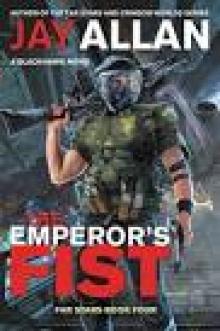 The Emperor's Fist
The Emperor's Fist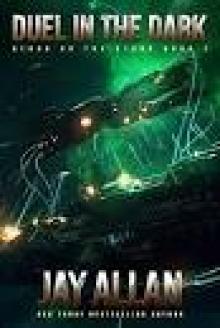 Blood on the Stars Collection 1
Blood on the Stars Collection 1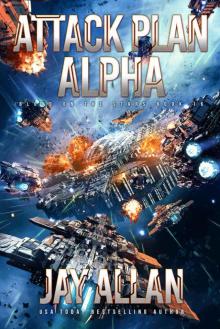 Attack Plan Alpha (Blood on the Stars Book 16)
Attack Plan Alpha (Blood on the Stars Book 16)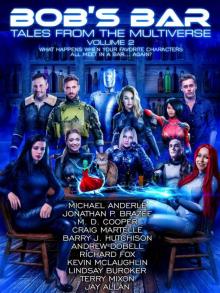 BOB's Bar (Tales From The Multiverse Book 2)
BOB's Bar (Tales From The Multiverse Book 2) The Others
The Others Nightfall
Nightfall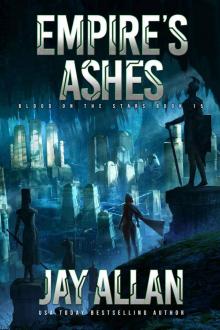 Empire's Ashes (Blood on the Stars Book 15)
Empire's Ashes (Blood on the Stars Book 15)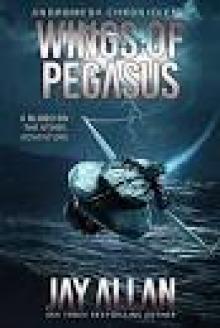 Wings of Pegasus
Wings of Pegasus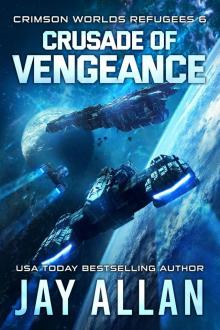 Crusade of Vengeance
Crusade of Vengeance The Last Stand
The Last Stand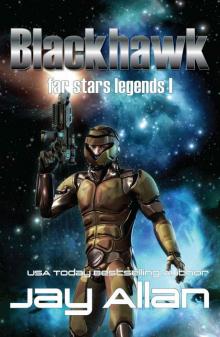 Blackhawk: Far Stars Legends I
Blackhawk: Far Stars Legends I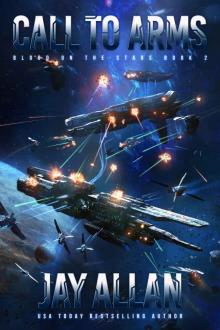 Call to Arms: Blood on the Stars II
Call to Arms: Blood on the Stars II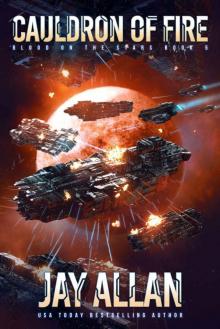 Cauldron of Fire (Blood on the Stars Book 5)
Cauldron of Fire (Blood on the Stars Book 5)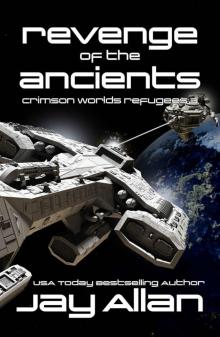 Revenge of the Ancients: Crimson Worlds Refugees III
Revenge of the Ancients: Crimson Worlds Refugees III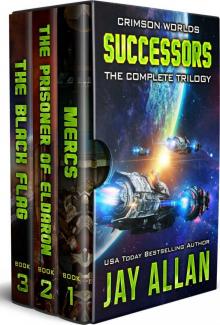 Crimson Worlds Successors: The Complete Trilogy
Crimson Worlds Successors: The Complete Trilogy The Grand Alliance
The Grand Alliance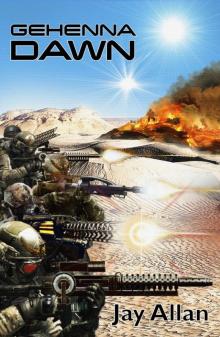 Portal Wars 1: Gehenna Dawn
Portal Wars 1: Gehenna Dawn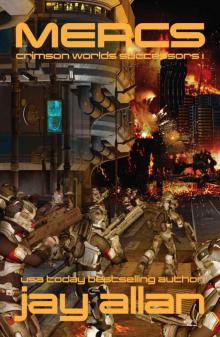 MERCS: Crimson Worlds Successors
MERCS: Crimson Worlds Successors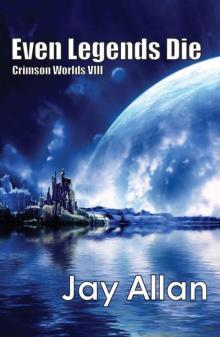 Crimson Worlds: 08 - Even Legends Die
Crimson Worlds: 08 - Even Legends Die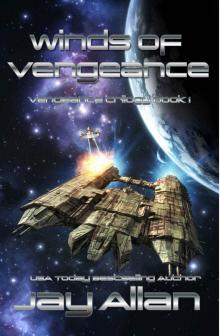 Winds of Vengeance
Winds of Vengeance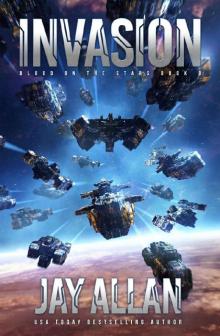 Invasion (Blood on the Stars Book 9)
Invasion (Blood on the Stars Book 9) A Little Rebellion (Crimson Worlds III)
A Little Rebellion (Crimson Worlds III)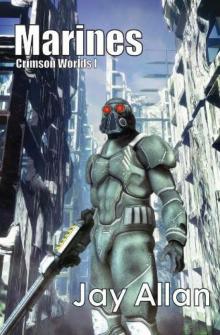 Marines
Marines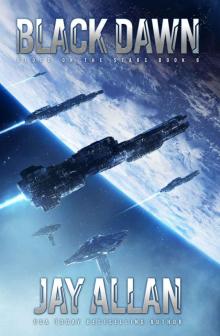 Black Dawn (Blood on the Stars Book 8)
Black Dawn (Blood on the Stars Book 8)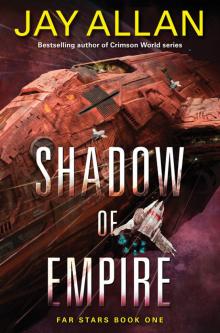 Shadow of Empire
Shadow of Empire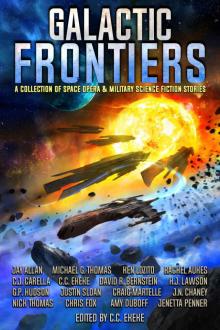 Galactic Frontiers: A Collection of Space Opera and Military Science Fiction Stories
Galactic Frontiers: A Collection of Space Opera and Military Science Fiction Stories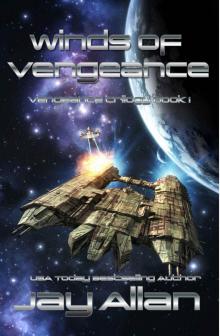 Winds of Vengeance (Crimson Worlds Refugees Book 4)
Winds of Vengeance (Crimson Worlds Refugees Book 4)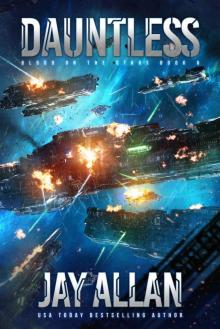 Dauntless (Blood on the Stars Book 6)
Dauntless (Blood on the Stars Book 6) Portal Wars: The Trilogy
Portal Wars: The Trilogy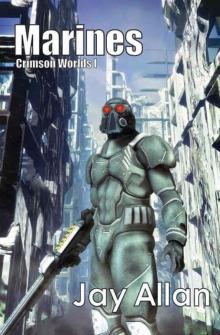 Marines cw-1
Marines cw-1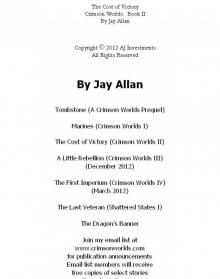 The Cost of Victory
The Cost of Victory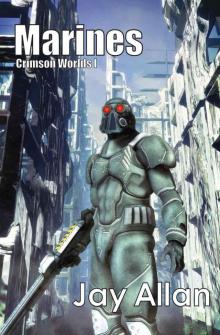 Marines (Crimson Worlds)
Marines (Crimson Worlds)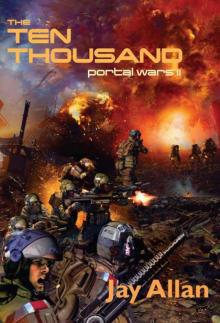 The Ten Thousand: Portal Wars II
The Ten Thousand: Portal Wars II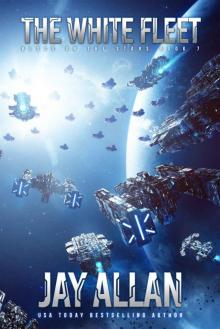 The White Fleet (Blood on the Stars Book 7)
The White Fleet (Blood on the Stars Book 7)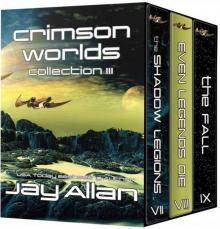 Crimson Worlds Collection III
Crimson Worlds Collection III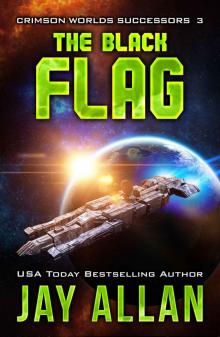 The Black Flag (Crimson Worlds Successors Book 3)
The Black Flag (Crimson Worlds Successors Book 3)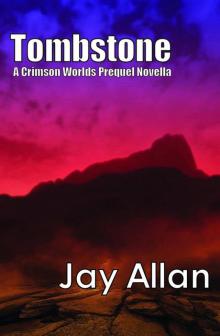 Tombstone
Tombstone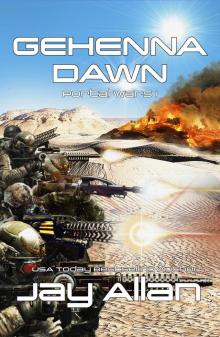 Gehenna Dawn
Gehenna Dawn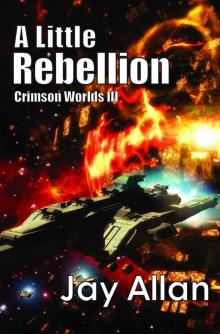 A Little Rebellion (Crimson Worlds)
A Little Rebellion (Crimson Worlds)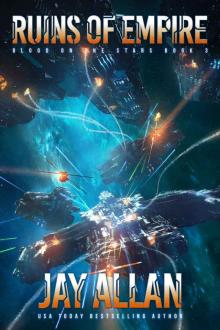 Ruins of Empire: Blood on the Stars III
Ruins of Empire: Blood on the Stars III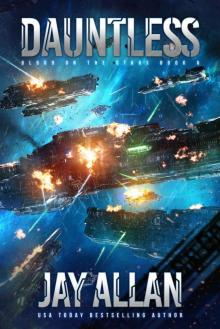 Dauntless
Dauntless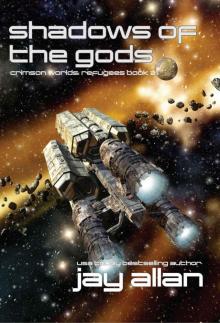 Shadows of the Gods: Crimson Worlds Refugees II
Shadows of the Gods: Crimson Worlds Refugees II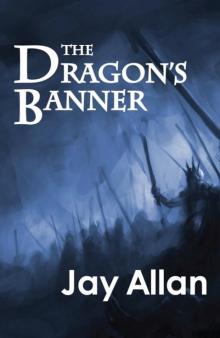 The Dragon's Banner
The Dragon's Banner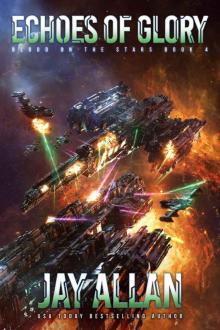 Echoes of Glory (Blood on the Stars Book 4)
Echoes of Glory (Blood on the Stars Book 4)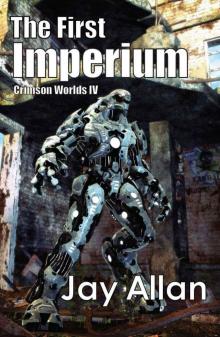 Crimson Worlds: 04 - The First Imperium
Crimson Worlds: 04 - The First Imperium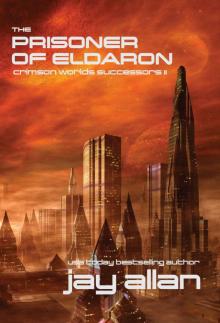 The Prisoner of Eldaron: Crimson Worlds Successors II
The Prisoner of Eldaron: Crimson Worlds Successors II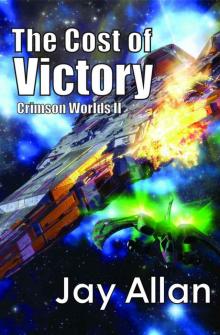 The Cost of Victory (Crimson Worlds)
The Cost of Victory (Crimson Worlds)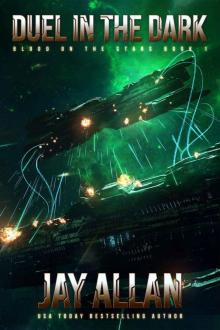 Duel in the Dark: Blood on the Stars I
Duel in the Dark: Blood on the Stars I Into the Darkness: Crimson Worlds Refugees I
Into the Darkness: Crimson Worlds Refugees I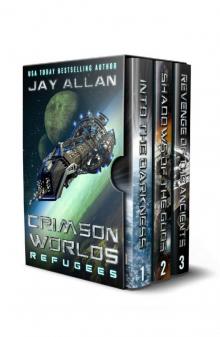 Crimson Worlds Refugees: The First Trilogy
Crimson Worlds Refugees: The First Trilogy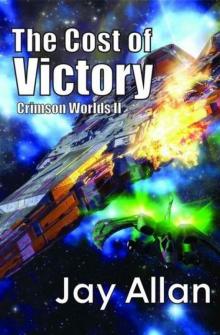 The Cost of Victory cw-2
The Cost of Victory cw-2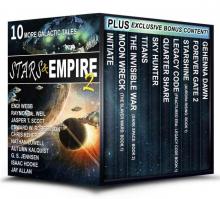 Stars & Empire 2: 10 More Galactic Tales (Stars & Empire Box Set Collection)
Stars & Empire 2: 10 More Galactic Tales (Stars & Empire Box Set Collection) Flames of Rebellion
Flames of Rebellion Stars & Empire: 10 Galactic Tales
Stars & Empire: 10 Galactic Tales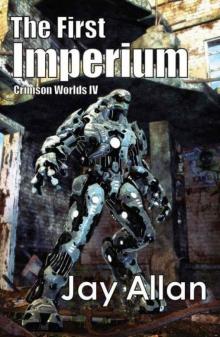 The First Imperium cw-4
The First Imperium cw-4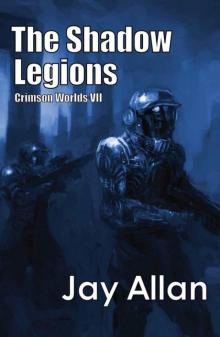 Crimson Worlds: 07 - The Shadow Legions
Crimson Worlds: 07 - The Shadow Legions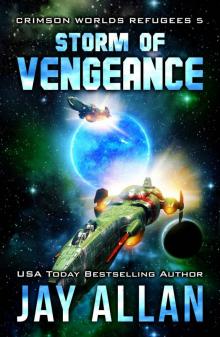 Storm of Vengeance
Storm of Vengeance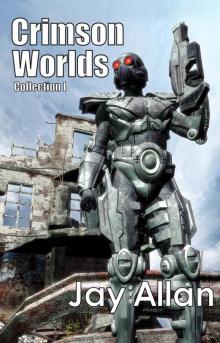 Crimson Worlds Collection I
Crimson Worlds Collection I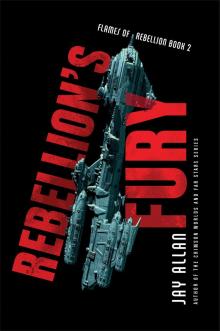 Rebellion's Fury
Rebellion's Fury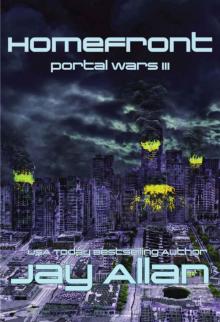 Homefront: Portal Wars III
Homefront: Portal Wars III Tombstone (crimson worlds)
Tombstone (crimson worlds) Crimson Worlds: Prequel - Bitter Glory
Crimson Worlds: Prequel - Bitter Glory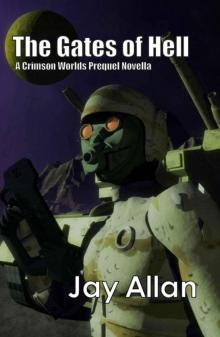 Crimson Worlds: Prequel - The Gates of Hell
Crimson Worlds: Prequel - The Gates of Hell The Fall: Crimson Worlds IX
The Fall: Crimson Worlds IX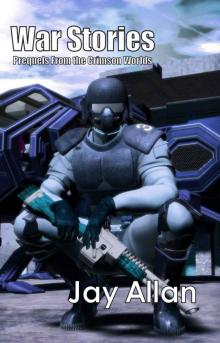 Crimson Worlds: War Stories: 3 Crimson Worlds Prequel Novellas
Crimson Worlds: War Stories: 3 Crimson Worlds Prequel Novellas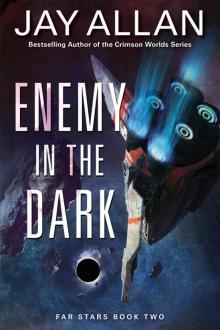 Enemy in the Dark
Enemy in the Dark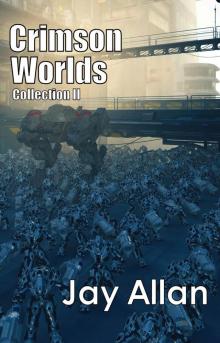 Crimson Worlds Collection II
Crimson Worlds Collection II